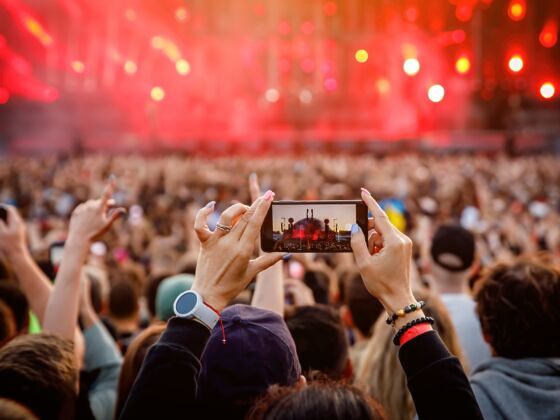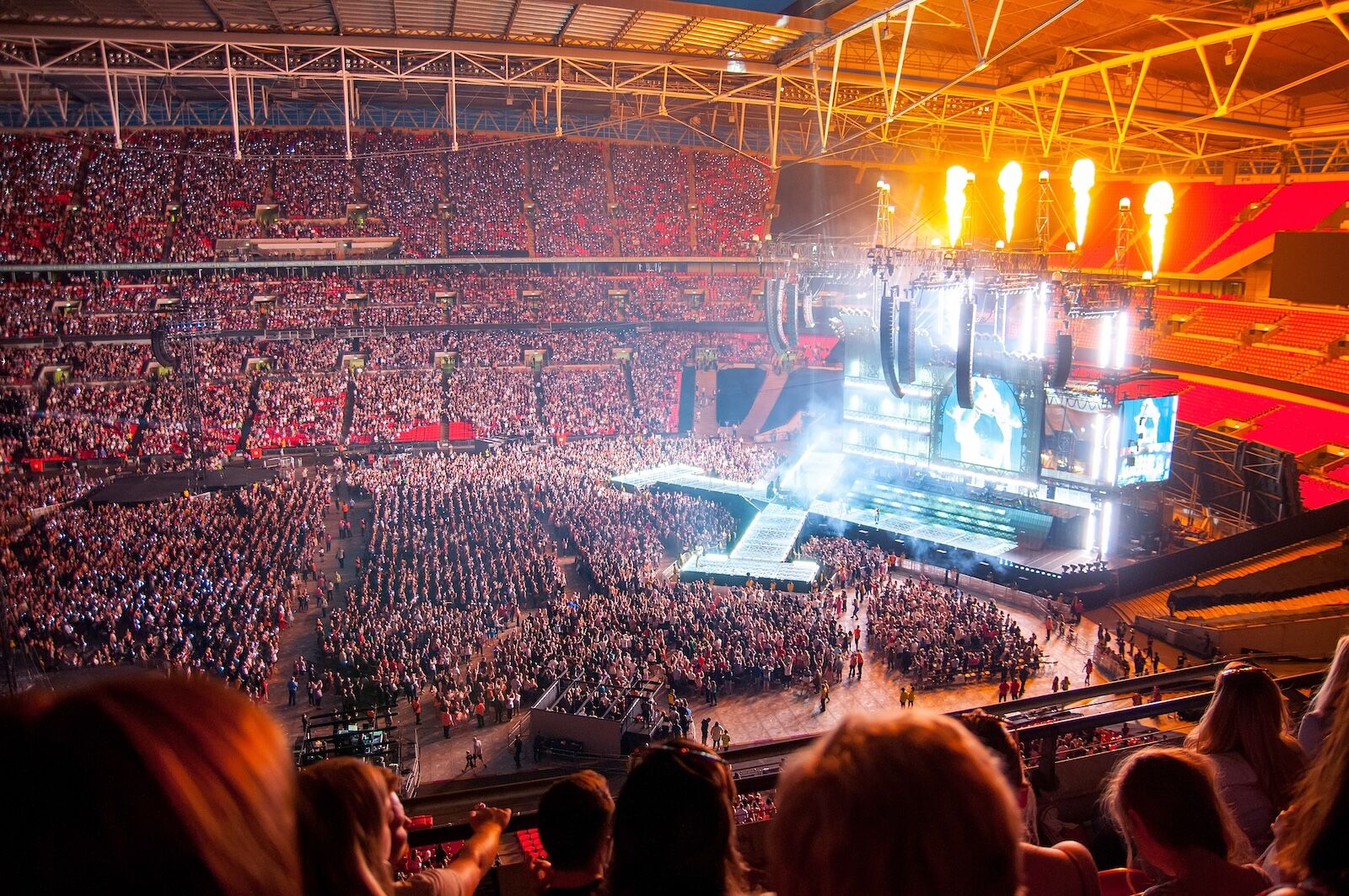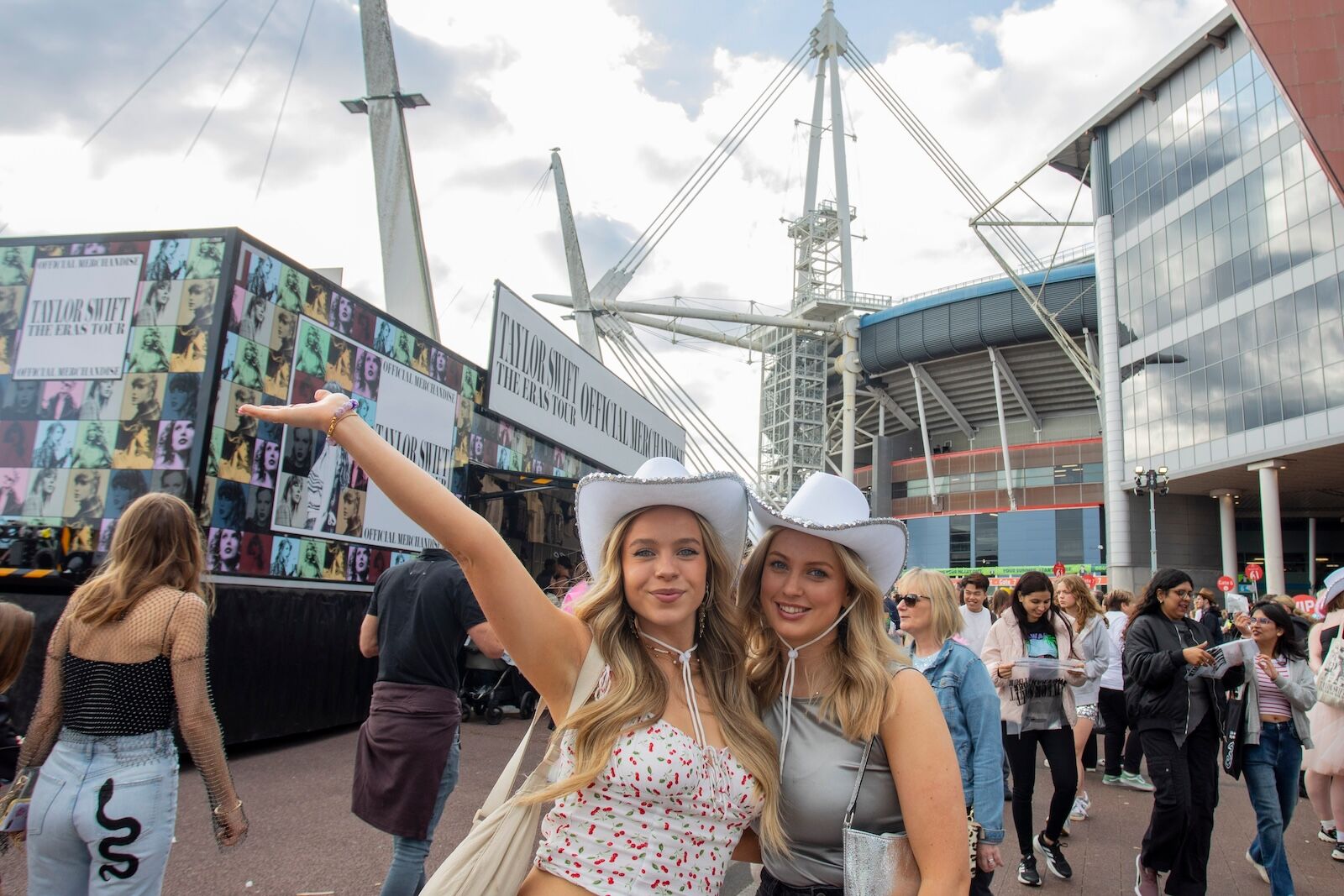Gig-tripping is a brand-new term used to describe a concept that’s not new at all: Traveling to attend a concert. After all, in 1969, hundreds of thousands of people road tripped to Woodstock to attend the iconic festival. And since then, just about everyone who lives outside of a big urban center and loves a good show has probably done it, too. Even I, who prefer to avoid crowds and tend to not like loud music, have done it. I’ve lost count of how many times I’ve driven the many hours that separate my rural hometown from Vancouver, BC, Canada, to see Florence and the Machine, Arctic Monkeys, and Snoop Dog, among others, live. That said, the trend of gig-tripping, which took off dramatically with Taylor Swift’s ongoing and colossal The Eras Tour, is a little more involved than just driving for a few hours to a venue. Modern gig-trippers know no obstacles. They tend to travel cross-country or even internationally to see the artists they love so much, building entire epic trips around musical performances.


Traveling For a Concert? Follow This Expert Checklist For a Seamless Trip
Of course, gig-tripping, especially when it involves going abroad, requires some logistics, but it’s hardly insurmountable. Matador asked four expert concert-goers, from radio show hosts to entertainment industry veterans, wandering professional DJs, and self-professed music nerds for the low-down on the best strategies to adopt to create the smoothest, most enjoyable gig-trip possible. Here’s what they said.
- Before you even buy your concert tickets
- Before you leave to your destination
- Before you make your way to the venue
- What to wear and carry with you to the concert
- At the venue
Before you even buy your concert tickets
Check your bank account
While Ralph Sutton, a radio show host with decades of experience hosting music festival and cruise concerts, recommends to fly by the seat of your pants and “book the concert first, then worry about everything else,” it may not be the way to go for everyone.
If you’re more cautious than spontaneous, before you purchase your concert tickets, think about the time and funds you’ll need to make it all happen. While the ticket itself might be cheap, there’s a lot more to take into account, including flights, accommodations, meals, etc.
When asked for his thoughts on gig-tripping, Stephen Glicken, CEO of the live entertainment company Project Admission and avid concert-goer, explains, “In my experience it is often more expensive, but worth it. Tickets may sometimes be more affordable but you have other costs that add up.”
Chris Oberman, a professional DJ and travel blogger, echoes Glicken’s thoughts. “While it requires time, preparation, and money, attending a concert or festival in person is a unique experience. When you’re attending a show you’re part of the whole vibe, you’ll meet friendly and like-minded people who all share the same passion for the same type of music and artists.”
Think beyond the concert
If you’re traveling a long way, you’ll want to make the trip count. Consider the destination and what else you might wish to do, see, and try out there besides the show.
For Glicken, who recently traveled from Tokyo to Singapore to attend Taylor Swift’s The Eras Tour, a concert is a great way to anchor a trip. “You have a target that will likely in and of itself make the trip worthwhile, and then you have the chance to visit and see a city.” Glicken had seen Taylor Swift’s show multiple times prior to his trip to Singapore, yet he says that it was “100% worth it to experience the show with a different crowd and then use it as an excuse to experience the culture and food in Singapore.”
Consider the venue

Photo: Christian Bertrand/Shutterstock
For Oberman, it’s also important to consider the concert venue itself before you make a booking. “The music and the artists are my main motivations, sometimes coupled with the uniqueness of the location,” he says in an email conversation. “For instance, I’ve attended the Melt festival in Germany several times because it is held at an outdoor industrial museum with enormous excavators, an incredibly unique setting.”
While you might not be as much into heavy machinery as Oberman, take the time to look at the venues the artist will visit during their tour. Some may be more intimate, some more grand, and some better located than others, all of which can greatly enhance your experience.
Before you leave to your destination
Save your hard-earned dollars
Mariana Montes Mendoza, music lover and local tour guide and travel writer at Vibe Adventures tour agency advises that once you’ve purchased your ticket and booked your trip, you need to keep an eye on the state of your finances. “I prepare my budget by saving many months before, so that I would not be limited and be able to buy merchandise or eat without being so worried about money. If I’m going to travel that far, I should take the opportunity to get the most I can from that place.”
Arrive early at your destination
One thing all the experts we talked to agreed upon when it came to gig-tripping is this: Don’t show up at the destination on the day of the concert. Flight delays can easily raise your anxiety and lead you to miss the event. Planning to arrive one or two days before the show will give you some buffer time and will allow you to rest from the journey and find your bearings in the city. If you arrive less than 24 hours before the show, Oberman recommends that you book an accommodation close to the venue so you can rest until the last moment.
The same goes for the day of your departure. Don’t leave the day after the show. Give yourself a day or two to recuperate and bask in the joy that the concert gave you.
Don’t be that traveler
Sutton also warns about checking out the rules and regulations of the country you are going to, which is something you should do every time you travel, no matter the reason. For example, if you’re planning to drink before the show, check out the legal drinking age, the public inebriation rules, and the open-container law at your destination. Sutton explains that one of his friend didn’t do his due diligence and paid a high price for it. “[He] was leaving a country that was weed-friendly — into one that wasn’t — and got arrested. Just don’t be that person, Google the rules!”
Before you make your way to the venue
Make a plan
Once you’ve arrived at your destination and you’ve dumped your bags at your accommodation, take 10 minutes to look at Google Maps and research public transportation options to the concert. Ideally, you’d have booked an accommodation from where you can easily get to and from the venue, but if you haven’t, now is the time to sit down and do some much-needed research.
Check out when the doors to the venue open and decide when you want to arrive. From there, look at how long it will take to get to the venue by whatever means you chose, and make sure that you have a back-up option — if you miss one bus, it’s good to know there’s another one coming in the next 10 minutes. It is also crucial that you know how long the show will be, as well as how and when you’re going to get back to your accommodation. You don’t want to be stuck without a way to get back to your place in the dead of night in a strange city.
Discuss all those options with those with whom you’re traveling, agree upon a schedule, and write down the various transportation options and their time. Better safe than sorry.
When to arrive at the venue
As far as the topic of when to arrive at the venue is concerned, the experts we talked to were almost unanimous: two hours early is a good amount of time to explore the venue, locate the bathrooms, lockers, and the emergency exits, look at the merch, purchase food and drinks, and find your seat before the lights go down without stressing out.
Check your tickets
Oberman urges those who gig-trip in groups to take the time to take a close look at their concert tickets before they leave for the venue. “If your friends have different types of tickets, such as a day pass instead of a weekend pass, or guest list versus VIP, they might need to enter through different gates,” he explains.
Research the rules of the venue
All the experts we talked to are adamant about one thing: Before you pack all the things you need to take with you to the show, check out what you’re allowed to bring into the venue. Some events/venues don’t allow backpacks, large cameras, food, glass bottles, etc. You don’t want to be turned back just because you didn’t take five minutes to look it up.
Make the most of your phone
You always have your phone with you so you might as well use it to its full extent. Sutton recommends that you take a picture of your tickets, as well as anything you may need, including your ID, the bus/metro schedule, your parking emplacement, etc. Oberman suggests that you “check if the concert has an app or website to download the schedule in case of poor reception at the venue.”
What to wear and carry with you to the concert

Photo: ComposedPix/Shutterstock
Everyone’s got their must-have, but the staples according to the experts we interviewed are:
- A charged-up cell phone for photos, videos, but also to contact your friends if you lose them, access Google Maps if you get lost, etc.
- A power bank to ensure your phone is always usable
- Ear plugs to save your hearing
- Comfortable shoes so you can be on your feet for several hours and keep dancing
- Weather-appropriate clothing. If the venue is outdoors, you’ll need a rain jacket, waterproof shoes, a waterproof bag, sunscreen, and a hat
- Pants with zipped pockets to keep your belongings safe
- An ID
- Wipes to stay clean even if the venue’s bathrooms are gross and lack toilet paper
- A Sharpie. “You never know who you might bump into and want an autograph!,” explains Sutton.
- Protein-heavy snacks like energy bars to keep you going
- Water to keep you hydrated
At the venue
If you are attending the show with a group, set up a meeting point for when the concert ends or if someone gets separated — the merch stand, for example. Some venues don’t have good cell phone reception and you might not be able to text or call your friends.
If you’re going to a festival, you can do the same thing. Oberman explains that whenever he goes to a festival with a group of friends they always use ‘left-front’ as their gathering place. “When you’re looking at the stage everyone will be at the left in the front, at any stage. Having this same meeting point at every festival stage can definitely help to keep the group together.”